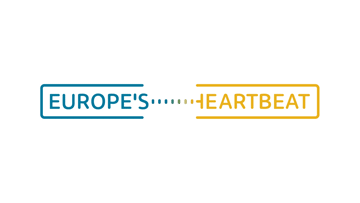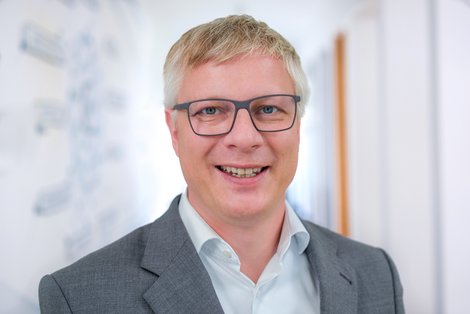With the AI.NRW competence platform, the state of NRW accompanies companies into the digital future. With practical advice, innovative projects and a strong AI ecosystem, AI.NRW helps SMEs and startups in particular to exploit the potential of artificial intelligence and to increase their competitiveness. In this interview, Managing Director Dr. Christian Temath talks about the platform and the many possible applications of AI.
- What is the AI.NRW competence platform and what are its goals?
AI.NRW is the competence platform for artificial intelligence in North Rhine-Westphalia, funded by the state of NRW. It is based at the Fraunhofer IAIS in Sankt Augustin near Bonn, one of the largest research institutes for applied AI in Europe. With AI.NRW, we want to bring artificial intelligence into practical application at the many companies in this state, especially in SMEs, thus strengthening NRW as a business location and creating nationwide visibility. To this end, we are bringing together cutting-edge research and innovative companies, for example in the AI.NRW flagship initiative: these are AI lighthouse projects in which experts from SMEs, startups, universities, colleges and research institutes work together and use AI to solve pressing real-world problems. The results help to improve processes in craft businesses, production halls and retail, for example.
- How does AI.NRW specifically support researchers, companies and startups in the field of artificial intelligence to advance the digital transformation and competitiveness in NRW?
As AI.NRW, we support SMEs and startups in North Rhine-Westphalia in particular as they embark on their AI journey. We offer various services that can be booked free of charge via our website ki.nrw. These include, for example, initial consultations such as our "AI.consultation hour" and the "AI.kick-off". In our "AI.shadowing" format, our experts go directly into companies and observe processes and workflows in order to identify, evaluate and make use of AI. And in workshop formats such as the AI Design Sprint™, we work with a company's employees to develop a concrete concept for an AI use case. Above all, we recommend starting small, simple and measurable. You should begin with a concrete process, one that you understand very well. So I can only motivate startups and founders to have the courage to deal with the topic of AI. We are happy to provide support.
I would also like to draw your attention to our digital AI.map. It is an overview map curated by AI.NRW, which we use to depict the AI ecosystem in North Rhine-Westphalia. It can be used to search for research institutions, universities and universities of applied sciences, etc. There are also numerous entries from the business sector: You can find out which companies offer AI solutions, and which application examples exist. This allows players from industry and research to network independently. We also list courses of study and training opportunities for the young professionals of tomorrow.
- Can you give examples of how and where AI has already changed the economy in NRW?
The AI.map I just mentioned, which currently contains 1,300 entries, is a good illustration of the growth of the AI ecosystem in North Rhine-Westphalia and provides countless examples. One prominent case is the Cologne-based "unicorn" DeepL. The company, which has made a name for itself with its machine translation system, is the highest-rated AI startup in Germany. In building energy management, for example, the green tech company Recogizer is using AI to help reduce energy consumption in commercial properties by more than 20 percent. AI can also be used to save resources in route and order planning (adiutaByte) and the production of fresh foods such as baked goods (Foodforecast Technologies). And AI can also be used to improve products and increase productivity. For example, AI-assisted quality assurance "damage detection" can be used to inspect cars for hail damage or solar panels for scratches without fatigue. In another example, a plastic window manufacturer (VEKA AG) is using generative AI and digital twins to develop new window profiles. These are just a few examples of how AI has changed and will continue to change the economy in NRW.
- In which sectors is AI likely to become even more important or finally take hold? And where do you still see untapped potential for AI applications?
As a cross-sectional technology, AI is used practically everywhere, as the examples just mentioned illustrate – in the automotive industry, in mechanical engineering, and in the service sector. As a result, new AI tools based on generative AI will be available to assist us in many areas of work in the future. I see Gen AI primarily in the area of product development and improvement: here, for example, an AI will make suggestions for new product variations or for optimizing existing designs, which can then be used in the further development process. I also believe that repetitive, administrative processes in particular will be largely supported by artificial intelligence in the future, for example in the medical sector – for example in document analysis or in the creation of medical and discharge letters. These are just a few examples of how AI has changed and will continue to change the economy in NRW.
I think there is enormous potential in the area of public administration, both in terms of the future wave of retirements and the need to continue to provide services in the long term. On the other hand, AI can be used to improve the accessibility of services to much broader segments of the population, for example when it comes to language barriers or filling out complicated forms correctly.
- What opportunities does AI in NRW open up for international companies?
The AI ecosystem in NRW is characterized by a lively startup scene, a traditional industry and many "hidden champions" who have a very good command of their specific sectors and domains and are continuously developing specific AI applications. This broad-based economy, coupled with innovative, globally successful companies from NRW, provides international players with numerous points of contact to successfully introduce AI into the economy on a broad scale. For example, Microsoft's billion-euro investment in two data centers and AI training programs in the Rhenish mining region around Aachen shows that NRW is an attractive location. This creates ideal conditions for the establishment of AI companies and startups.


